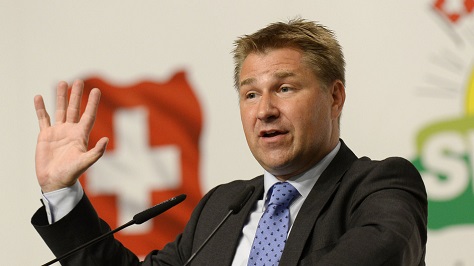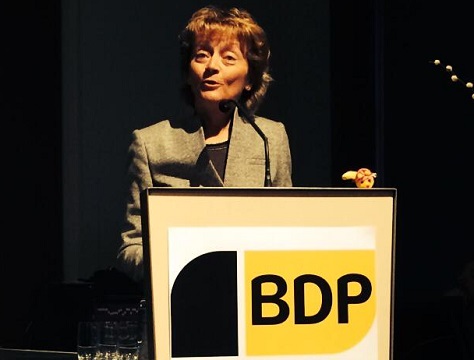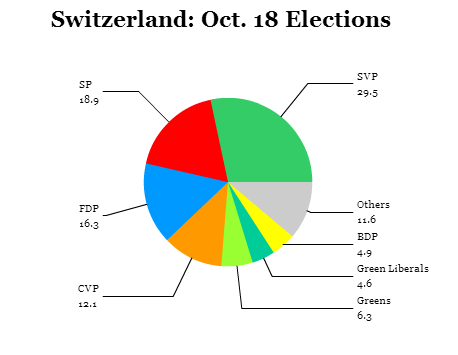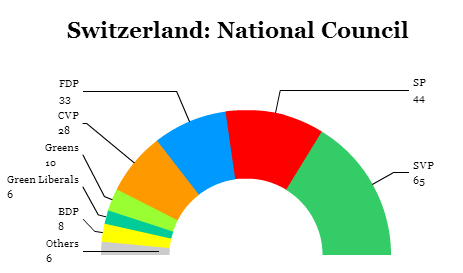
Amid dual concerns about rising immigration and creeping concerns about the reach of the European Union’s writ in non-member Switzerland, today’s Swiss national elections are further evidence of a rightward shift that could complicate governance in a country with a long tradition of consensus-driven government.
![]()
Though Switzerland hasn’t received the deluge of refugees as neighboring Austria and Germany, fears about the largest number of refugees arriving in Europe since World War II, boosted the anti-immigration, right-wing Schweizerische Volkspartei (SVP, Swiss People’s Party), which won a record 65 seats in Switzerland’s 200-member Nationalrat (National Council), the lower house of the bicameral Bern-based Bundesversammlung (Federal Assembly) — more seats than any other single party has won at any election since 1917. Those gains follow the successes of the far-right Freedom Party in two state elections in the past three weeks in neighboring Austria.
When one party wins an election in Switzerland, it doesn’t mean that the party controls government. Instead, under the Swiss ‘concordance’ system, the four major parties of both left and right share membership on the Federal Council, a seven-member executive board that governs Switzerland and that is indirectly elected by the Federal Assembly. Historically, the Federal Council prides itself on collegiality and compromise. The Swiss presidency rotates annually among the seven members, though the presidential role is chiefly ceremonial. Furthermore, there’s no equivalent of a ‘prime minister,’ and the strong regional government of Switzerland’s 26 cantons means that executive power in the country has always been particularly weak, dating to the federal system agreed in 1848.
But Sunday’s result is prompting calls for a Rechtsrutsch — a move from a grand-coalition government to a more clearly right-leaning government on the basis of the SVP’s superior result.
****
RELATED: Swiss immigration vote threatens access to EU single market
****
Both houses of the Federal Assembly will determine the Federal Council’s composition in a secret ballot on December 9. The SVP’s rising strength means that it will take a much more aggressive stand toward shifting the Federal Council to the right, tightening Swiss policy on immigration and the European Union.
In addition to the National Council, Swiss voters were also electing all 46 members of the upper house, the Ständerat (Council of States).
Despite the SVP’s rising popularity and historically tough naturalization laws, Switzerland has one of the world’s highest immigration rates — 28.9% of the Swiss population are immigrants, much higher than 15.9% in Sweden, 12.4% in the United Kingdom or 11.9% in Germany. Nevertheless, Swiss voters in February 2014 narrowly approved a plan to introduce a quota system for immigration, against the interests of Swiss business interests.
The quota system also violates the terms of the bilateral treaty between Switzerland the European Union. Though Switzerland is not a member of the European Union, it is a member of the EU-administered single market and, accordingly, agrees to certain principles as a condition for entry to the single market, including the free movement of workers throughout Europe.
The Swiss government has until 2017 to reconcile the 2014 referendum result with its obligations under the Swiss-EU treaty. The SVP’s victory in today’s election makes it more difficult for Switzerland and the European Union to reach a consensus on immigration. EU negotiators are unlikely to want to grant major concessions to Switzerland, because that could encourage far-right politicians in other countries to demand concessions, which could destroy one of the fundamental pillars of EU policy. But the 2015 refugee crisis revealed strains in the Schengen zone, especially among poorer eastern European countries with less appetite for welcoming refugees from outside Europe. Furthermore, British prime minister David Cameron hopes to renegotiate opt-outs from EU policy on justice, economics and, potentially, migration before the 2017 EU membership referendum in the United Kingdom that could well result in voters choosing to leave the European Union altogether.
Immigration and EU policy will not, however, be the only matters that Switzerland’s next government will face in the next four years.
The SVP has opposed recent decisions to loosen bank secrecy laws in a country that has always been known for its fierce neutrality and a tradition of financial discretion. Switzerland will likely hold a referendum next year on a proposal to introduce a guaranteed basic income for all Swiss citizens, a debate avidly anticipated by both economists and advocates to roll back the global trend of greater income and wealth inequality.
The second-placed Sozialdemokratische Partei (SP, Social Democrats) lost little support and is likely to continue to hold two seats on the Federal Council.
The third-placed FDP/Die Liberalen (FDP/Liberals), which also holds two seats on the Federal Council, also gained vote share in Sunday’s election. Though it agrees with the SVP on economic policy, it is far more pro-immigration and pro-Europe.
The fourth-placed Christlichdemokratische Volkspartei (CVP, Christian Democrats), once the strongest party of the Swiss right, is expected to retain its single seat on the Federal Council.
But the gains of the SVP and the FDP, taken together, amount to a surge of over 4% for the Swiss right — a big change for a country where elections do not typically result in larges shifts in either direction, ideologically. Though the Social Democrats themselves didn’t necessarily lose any ground, their center-left allies did — the leftist Grüne Partei der Schweiz (the Swiss Green Party) and the more centrist Grünliberale Partei der Schweiz (the Swiss Green Liberal Party) both lost vote share.
That will certainly embolden the SVP, though the moderating influence of the FDP, a party with more deference to tenets of Swiss collegiality, could smooth any of the SVP’s jagged edges as it attempts to pull government rightward.
Most of all, internal SVP dynamics will play the most important role in shaping the new Federal Council. That’s been the case for over a decade — in 2004, the SVP’s leader at the time, Christoph Blocher, was appointed to an SVP seat on the Federal Council. As justice and home minister, however, Blocher demonstrated little patience for the consensus-driven model of Swiss governance and used his position to advance often controversial positions on immigration and law enforcement, while openly criticizing fellow members of the Federal Council.

Though the SVP’s breakout performance in 2007 left it the largest party in the Swiss assembly, the National Council chose to replace Blocher on the Federal Council with Eveline Widmer-Schlumpf, a moderate SVP legislator. Blocher, angered that Widmer-Schlumpf had edged him out of the Swiss executive, arranged for her expulsion from the SVP. She thereupon founded a new party, the Bürgerlich-Demokratische Partei Schweiz (BDP, Bourgeois Democratic Party).
Since 2010, Widmer-Schlumpf has served as the highly regarded finance minister of the Federal Council, and she held the ceremonial rotating presidency in 2012. She’s probably most well-known in the United States for her decision not to extradite film director Roman Polanski, contrary to the wishes of US prosecutors, and as finance minister, she has played an important role in the unfolding UBS bailout.
The SVP later regained one of the seats on the Federal Council in 2009 when Ueli Maurer was appointed. Though Maurer, who has served as defense minister, has proven less controversial than Blocher, he’s still one of the party’s leading hardliners, and he’s one among the chief architects of the SVP’s often controversial political campaigns in the mid-2000s — for example, a referendum to ban the construction of minarets — that many critics believe embraced outright xenophobia or even racism.
Blocher remains the SVP’s vice president, however, and his daughter Magdalena Martullo Blocher won a seat in the eastern canton of Graubunden. Though the SVP chiefly avoided the controversial posters of past campaigns in 2015 and campaigned on the simple slogan of ‘Stay free,’ some southern candidates took a less nuanced approach with posters that warned in no uncertain terms of the perceived dangers of admitting Muslim refugees.
With the SVP’s gains in today’s election, they may try to replace Widmer-Schlumpf on the Federal Council with a more hard-line SVP legislator. As the BDP sank from around 5.4% support in the 2011 elections to around 4.9% in Sunday’s election, Widmer-Schlumpf has a more tenuous political claim to the Federal Council.
Toni Brunner, who replaced Blocher as the SVP leader in 2007, has said that it will demand two seats for the SVP on the next federal council. One potential compromise that could maintain the current ideological balance would, in essence, cede one of the FDP’s two seats to the SVP while retaining Widmer-Schlumpf on the federal council — a result that might annoy the Liberals, given their own gains, but might find support among the Social Democrats. Given the opaque vote for the Federal Council’s seven members, though, it’s difficult to predict exactly how the SVP’s gains might translate into change in the executive’s composition.


